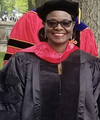RELATED LINKS
Bertrade Ngo-Ngijol Banoum
 E-mail Address: bertrade.ngo-ngijol-banoum@lehman.cuny.edu
E-mail Address: bertrade.ngo-ngijol-banoum@lehman.cuny.edu
Phone: 718-960-1160 (WST); 718-960-7722 (AS)
Office: Carman Hall, Room 221 (WST) and Room 281 (AS)
Office Hours: T, 11:30am-12:30pm, and by appointment
Rank: Associate Professor
Degrees and Sources of Degrees: B.A., Univ. of Yaoundé, Cameroon; M.Litt., Univ. of Edinburgh, Scotland; Ph.D., Univ. of Essex, England
Professor Ngo-Ngijol Banoum carries a heavy burden of teaching and service in the Department of African & African American Studies and the Interdisciplinary Program in Women’s Studies. Under her directorship, the Women’s Studies Program at Lehman remains a vibrant center for the exchange of ideas, a rewarding opportunity for students to learn more about themselves and their society, and a friendly place to hang out. Professor Banoum organizes a full slate of events, including an annual open house, scholarly presentations by Lehman faculty and distinguished guest speakers, a student-faculty read-in in honor of Black History Month, panel discussions to celebrate Hispanic Heritage Month, Women’s History Month, Asian-Pacific Heritage, and more.
Professor Ngo-Ngijol Banoum's academic interests are in gender and women's studies; African cultural studies, with a focus on African oral traditions, African languages and linguistics; translation studies; French and Francophone/Diaspora studies. Her current research focus is on women's human rights; gender construction in language and society; African women's verbal art and knowledge production; women's movements: from local organizing to global networking for social change.
Honorary member, the Golden Key International Honour Society; Associate, the Columbia University Seminar on Africa.
- “Negritude”, in Africana Age: African and African American Transformations in the Twentieth Century, by the Schomburg Center for Research in Black Culture, at exhibitions.nypl.org/africanaage/essay, 2011.
- "Women’s Human Rights", in the Encyclopedia of Sex and Gender, edited by Fedwa Malti-Douglas. Vol. 4. Detroit: Macmillan Reference, 2007, pp. 1546-1552. 2007.
- co-editor. The Role of Women in World Peace & the Role of Men and Boys in gender Equity. New York: Lehman College, 2005.
- "The Yum: An Indigenous Model for Sustainable Development", in African Gender Studies: A Reader, edited by Oyeronke Oyewumi. New York: Palgrave/Macmillan, 2005.
- "Bantu Gender Revisited Through and Analysis of Basaá Categories: A Typological Perspective", in Proceedings of the 4th World Congress of African Linguistics New Brunswick 2003, vol. 4), edited by Akinbiyi Akinlabi / Oluseye Adesola. Cologne: Rüdiger Köppe Verlag, 2004.
- co-editor. "Africans on the Move: Transnational, Intranational, and Metaphorical Migrations." Ìrìnkèrindò: A Journal of African Migration, http://www.africamigration.com, 2003, pp. 1-29.
- "Cultural Construction of Gender in African Oral Tradition: Images of Women in the Basaá.Epic." Women’s Studies Review, Lehman College, the City University of New York, Spring 2003, pp. 3-8.
- "Translating the Basaa Oral Epic Bon ba Hiton." in Metamorphoses, Journal of Literary Translation, Vol. 10.1, 2002, pp. 260-307.
- co-editor. "Irìnkèrindò: An Idea Whose Time Has Come." Ìrìnkèrindò: A Journal of African Migration, http://www.africamigration.com, 2002, pp. 1-23.
- "The Grassroots Women’s International Academy at EXPO 2000: Linking Living and Learning Communities from the Ground Up." Women’s Studies Review, Lehman College, the City University of New York, Spring 2002, pp. 3-8.
- "The Group of Common Initiative of the Bogso Women Farmers (Cameroon)." EXPO 2000 International Fair and Dubai International Award for Best Practices Panel, at http://habitat.aq.upm.es/dubai/00/bp429.html., 2001, 12 pages.
- Article translated into Spanish: "El Grupo de Iniciativa Comun de las Mujeres Agricultoras de Bogso (Camerun)" by the Escuela Técnica Superior de Arquitectura de Madrid del Ministerio de Fomento de España.
- "Celebrating the Heroic Life of an African Warrior Queen, A Hundred Years Later: Yaa Asantewa, the Queen Mother of the Asante Empire", in the Women's Studies Review, Lehman College, the City University of New York, Spring 2000, pp. 3-5.
- “Engendering Personal Names in Basaa Culture: From the Origins to the Epic Tradition and Beyond”, in Naming Africans: On the Epistemic Value of Names, eds. Oyèrónkẹ́ Oyěwùmí and Hewan Girma (Palgrave MacMillan, 2023), 61-84.
- “Embodying African Women’s Epistemology: International Women’s Day Pagne in Cameroon”, (co-authored with Anne Rice), in Writing through the Visual/Virtual: Inscribing Language, Literature, and Culture in Francophone Africa and the Caribbean, eds. Renée Larrier and Ousseina D. Alidou (Lexington Books, 2015), 3-14








